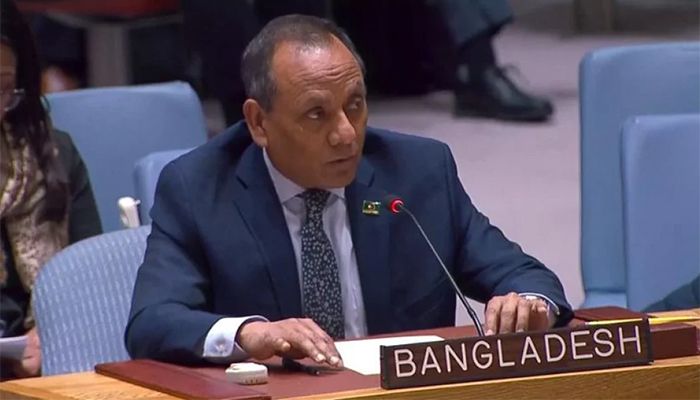
Desk Report
Publish: 04 Aug 2023, 03:02 pm

Ambassador Muhammad Abdul Muhith || Photo: Collected
As millions of people worldwide are at risk of going hungry, Bangladesh has advocated for a collaborative response rather than a fragmented strategy to solve the global food security caused by conflicts.
"In the face of conflict-induced global food insecurity, a fragmented approach will not suffice. We must come together in a collective endeavour to address this crisis," said Ambassador Muhammad Abdul Muhith, permanent representative of Bangladesh to the United Nations in New York, during his address at the Security Council's open debate on Famine and Conflict-induced Global Food Insecurity on Thursday.
Ambassador Muhith highlighted the multiple initiatives done by the government of Bangladesh to address food insecurity at both the national and international levels, citing the catastrophic effects of continuing wars and climate change on global food security.
He emphasized that the Bangladeshi government has prioritized investments in agri-food systems and adopted a number of budgetary and policy steps to address the conflict-driven global food crisis.
He added that Prime Minister Sheikh Hasina has urged everyone to actively engage in indigenous food production methods and develop idle land in every household.
Ambassador Muhith emphasized the significance of tackling underlying causes that influence food costs and availability to food during crises in order to strengthen collective action against food insecurity.
In this regard, he pledged full support for the secretary-general's call to keep markets open, remove unnecessary export restrictions, and release food reserves to improve the food supply.
He also underscored the urgency of renewing the “Black Sea Grain Initiative” to ensure stable food supplies.
Moreover, he emphasized the need for increased international cooperation, including South-South cooperation, climate financing, and technology transfer, to support vulnerable countries like Bangladesh in mitigating the adverse impacts of climate change on food security.
Ambassador Muhith strongly condemned the use of hunger and starvation as weapons of war and encouraged all members to avoid from using starvation as a military tactic. He also urged warring parties to uphold international law and humanitarian standards.
Ambassador Muhith drew the Security Council's attention to the ongoing Rohingya crisis and the lack of funds for the plan to provide humanitarian aid to the Rohingya and pleaded with them to take prompt action to address the situation in Myanmar.
He urged everyone to work together to make the country's conditions favorable for the safe and long-term return of the Rohingya.
He urged the world community to keep contributing enough money to sustain the Rohingya refugees until they can return.
Source: UNB
Subscribe Shampratik Deshkal Youtube Channel
© 2024 Shampratik Deshkal All Rights Reserved. Design & Developed By Root Soft Bangladesh